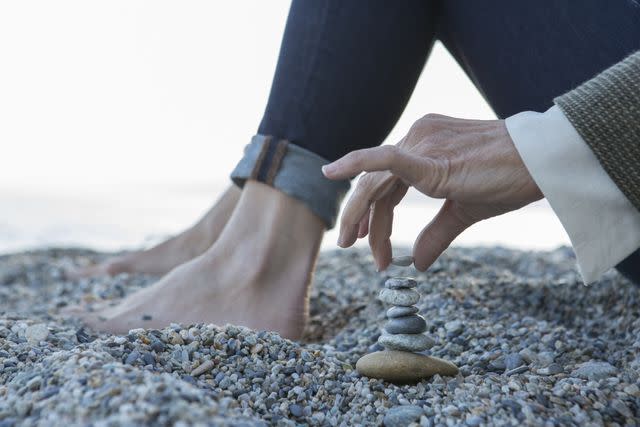10 Things to Stop Doing If You're Stressed
Are You Sabotaging Yourself? Here's How to Stop
Medically reviewed by Amy Morin, LCSW
Many of the stressors we face in life are not under our control. However, our responses to these things can either lighten the load or add weight to our stress levels. Many of the thoughts we have and actions we take when stressed can contribute to our problems by intensifying the already negative feelings we may have.
It is wise to look at the things we can control, stop doing things that perpetuate and exacerbate our stress levels, and focus on what we can do to help ourselves feel more relaxed. Read on to discover 10 bad habits that are commonly done by people under stress that only make things worse.
Stop Ruminating

We all face things that cause us stress. It's natural to think about these stressors to see what we can do to better understand the situation so we can change it. But sometimes we can slip into a type of thinking that is unproductive, overly negative, and borders on obsessive. This type of thinking is known as rumination.
When we fall prey to rumination, we intensify the stress we are already feeling by focusing on the negative and continually reliving it. When we're in this pattern of thinking, our focus is more on what went wrong than on what we can do to fix things.
Rumination can become a habit. The good news is that habits can be broken, even habits of thought. Learn more about rumination and its role in your life, and see what you can do to stop ruminating.
Stop Losing Sleep

Many things contribute to our stress levels, but sleep deprivation is one factor that makes a bigger impact than we may realize.
Takeaway
When we don't get enough sleep, not only are we more reactive to stress, but our cognitive functioning isn't as sharp, which can contribute to mistakes made, causing a cycle of anxiety.
Stress can also impact our ability to get quality sleep. But by practicing good sleep hygiene, such as avoiding using televisions or computers before bed, going to bed the same time every night, and darkening the room, you may get better sleep.
Stop Eating Junk

What you eat can impact how you feel. Just as lost sleep can impact your reactivity, so can the wrong diet. If you have ever crashed from a caffeine high or a sugar rush, you already instinctively know this.
Stress can also impact what you crave and lead to emotional eating. This can present an even greater challenge for those who are stressed and trying to eat better, but it can (and should) be done! Learn more about the relationship between stress and your eating patterns and how to change your habits, if necessary.
Stop Leaning on Frenemies

Relationships can be fantastic sources of stress relief. When we experience times of stress, the emotional support, the helpful resources, and the stability that friends bring us can be quite a buffer against the challenges we face.
Additionally, many people find themselves looking to relationships the most when under stress. This response, like the more commonly discussed fight-or-flight response, can help us to get our needs met when we are experiencing stress. This response drives us to connect with others and share support.
That said, the stress of a conflicted relationship can take a heavy toll on your health and well-being. Relationships that are sometimes supportive and sometimes unpredictably conflict-riddled can be particularly difficult because there's an underlying sense of uncertainty and tension.
Because of this, it is very important not only to know when to let go of a toxic relationship but to know how to keep all the relationships in your life as healthy as possible.
Stop Overloading Your Schedule

When we are too busy, even if the schedule is filled with exciting things, we can feel more stressed, simply from a lack of downtime. If the schedule is cluttered with stressful or unnecessary activities, it becomes even more draining.
You may want to do it all, but learning to say no to excess demands on your time and cutting out the things in your life that stress you are great strategies for cultivating inner peace.
Stop Your Cognitive Distortions

Do you feel like you have a filter on your mind that produces negative thought patterns? Do you anticipate the worst outcomes in life? Do you focus in on the bad things that happen, while excluding the enormous joys? Does a gnat in the soup ruin the whole meal?
Thinking patterns can be habitual, and what you habitually think about colors your world and contributes to your stress levels. This can be good news if your thought patterns have an uplifting theme; you see the best in every situation, you find the silver lining, you get back up when you are knocked down, and you never lose hope.
If you can maintain a degree of optimism, your stress levels are significantly diminished. If this isn't your norm, you can actually learn to cultivate the habit of optimistic thinking.
Learn More: How to Reframe Stressful Situations
Stop Putting Off Exercise

Exercise can help you to feel less stressed in the short run and build your resilience toward stress in the long run. Many people know this but have a difficult time getting off the couch on a regular basis, especially when stressed, or too busy to get onto the couch in the first place.
Takeaway
It's ironic that sometimes when we would most benefit from exercise, that's the last thing we want to do. Push yourself to do it!
Stop Worrying

When we don't have control over a situation, we are more likely to fear the worst and feel more stressed. And, interestingly, we sometimes sense that we have less control than we actually have!
It can be quite damaging if you worry yourself into states of fear, dread, and panic. Because the stress response is triggered by perceived threat, an attitude that maximizes the negative can lead to us more often feeling threatened and, therefore, stressed.
Recognizing the choices we do have—even if they are not the choices we wish we had—can help us to feel more empowered, and less the victim of circumstance.
Stop Missing Opportunities

When stressed, we can often feel defeated or tired of the fight, and miss opportunities to take charge of a situation. Other times, we may experience disappointments or personal failures, and throw in the towel, which makes what could be a temporary setback into something much larger.
Every challenge in life offers a gift if you look for it. We can be thankful for the lessons we learn, even when they are difficult. Developing an attitude of gratitude can help you to feel happier and more appreciative of what you have, and it can also help you to see opportunities you may otherwise miss if you focus mainly on the things that are stressing you out.
Don't Ignore Your Stress

People often don't address their stress in a proactive way until they feel overwhelmed by it, and often then, they tend to be reactive rather than proactive, which doesn't always lead to the best decision-making. Build your resilience to stress by taking preventative action with regular self-care.
It is important to have an overall stress management plan that includes not only cutting out stressors where you can, and managing the stress that you currently feel, but also remaining aware of the signs of stress that you experience so you can quickly take action if you notice stress levels getting too high.
Takeaway
Stress management is an ongoing process, not a one-time act. In its best form, it's a lifestyle.
A Word From Verywell
If you feel stressed too much of the time, it's a good idea to create a plan for managing stress before your stress levels create obvious health issues. You can use the resources on this site to create a cohesive stress management plan that includes short-term stress relievers, long-term resilience-builders, and basic education in stress.
If your stress levels are unhealthy and you feel you need more support and resources, consider getting help.
Read Next: How to Think Positive
Read the original article on Verywell Mind.

